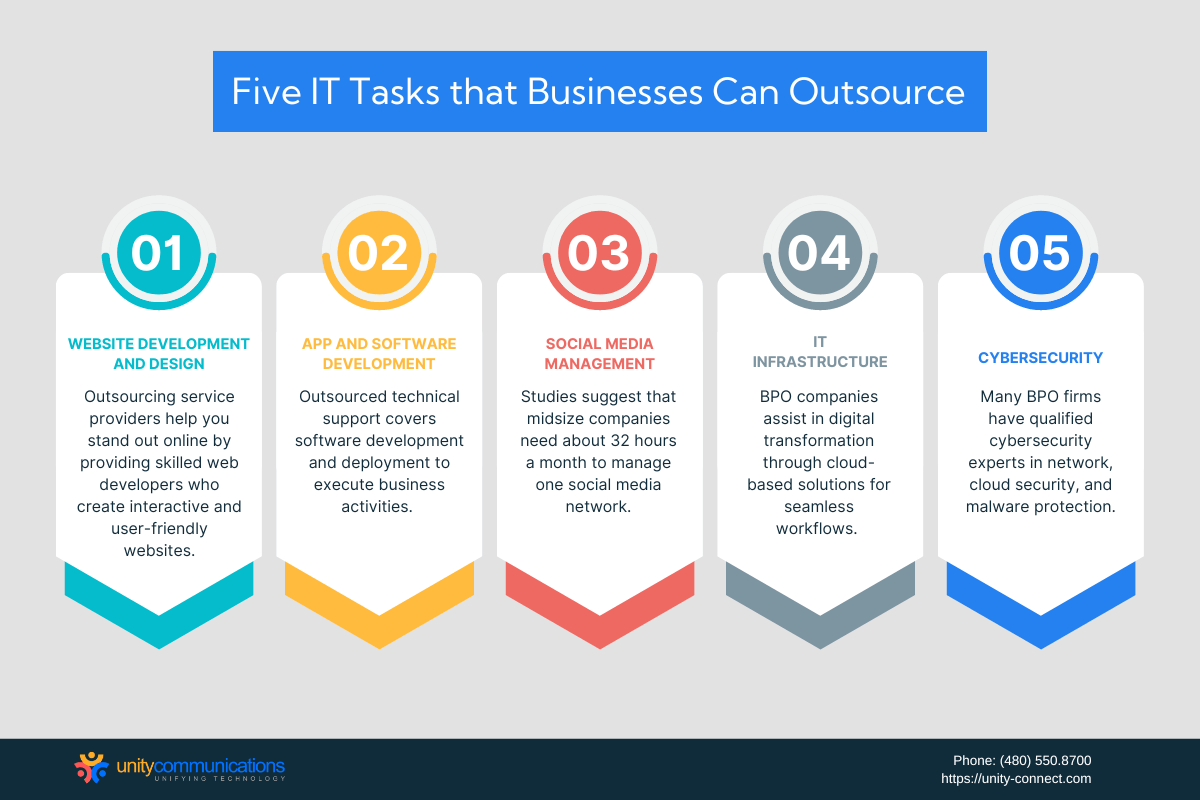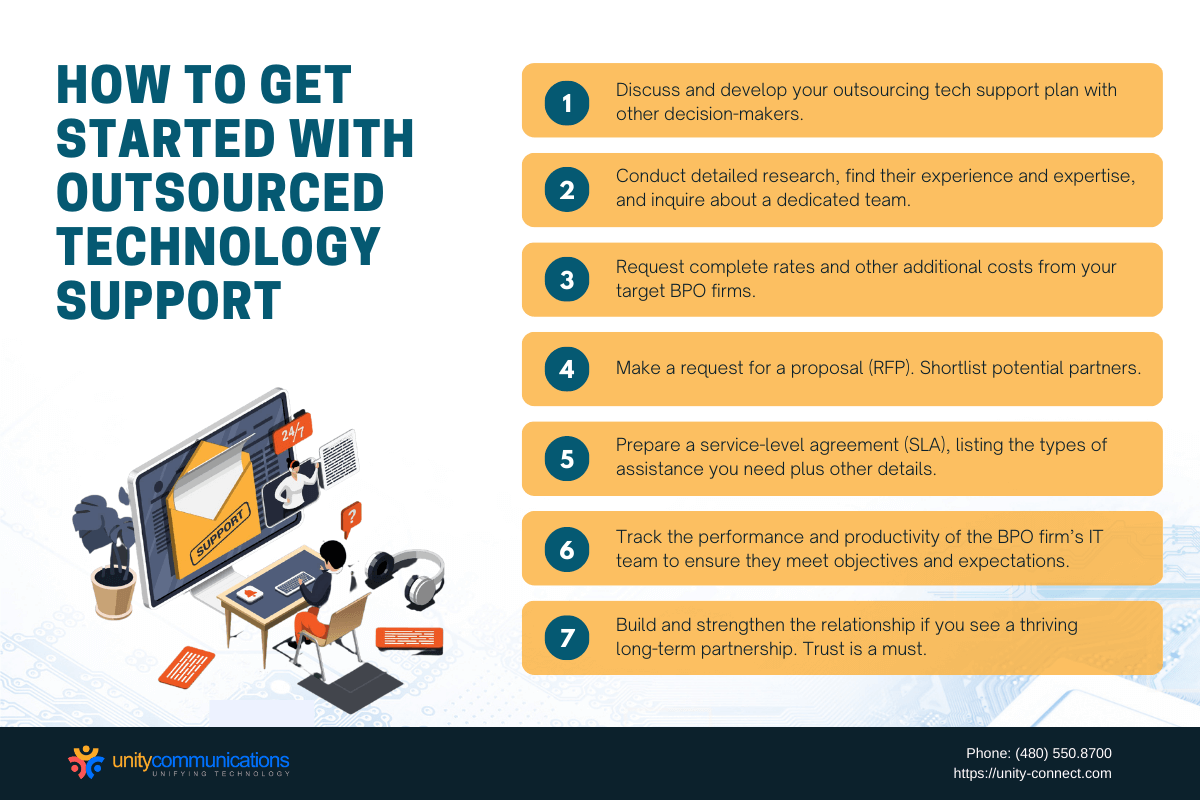IN THIS ARTICLE
Table of Contents
Are you planning to outsource your technical support processes but don’t know where to start?
If yes, you’ve landed on the right page.
This article provides balanced and insightful information to help you in your outsourcing decision.
Learn more about outsourced technical support—the advantages, downsides, tips, costs, and other important and useful facts –as this guide answers common questions about this effective strategy.
What Is Outsourced Technology Support?

Outsourced technology support is the professional assistance an IT service provider extends to its clients.
But what is an outsourced IT provider? It is a third-party company specializing in technical support services.
Technical support services typically refer to help-desk functions. It detects software faults, installs programs, checks product safety, and monitors compliance and security. The tech or IT support team answers client questions regarding products or services.
This back-office outsourcing function is a recognized business practice that enhances efficiency and services. It boosts competitiveness and adopts digital technologies.
Business process outsourcing (BPO) firms provide technical support offshore, onshore, or nearshore. Countries known for offshore BPO services are India, the Philippines, and Ukraine.
What Are the Advantages of Outsourced Technology Support?
Outsourcing your tech support needs provides a number of benefits to your company. Below are several of those benefits.
- Concentrate on the core business. Back-office outsourcing services such as technical support let you focus on revenue-generating initiatives. Thus, you devote more of your important resources to increasing your income.
- Access a modestly priced, efficient workforce. Service providers offer affordable rates. Their competent teams come from countries with lower labor costs than North America and Western Europe.
- Deliver service fast. Most consumers want fast resolutions to their technical issues. IT service providers offer speedy customer service, but not at the expense of quality.
- Decrease operating costs. BPO companies handle the tech support staff recruitment processes. Thus, you save time, effort, and money. There’s no need for new office spaces and equipment when outsourcing operations.
- Scale and customize functions according to business needs. Technical support service providers adapt to your needs. They adjust staffing to your seasonal demands without affecting workflows, activities, and processes.
What Are the Disadvantages of Outsourced Technology Support?
Here are two frequent problems with outsourcing and the recommended solutions.
Loss of Control
When you outsource data entry, tech support, or other functions, BPO firms apply their protocols, style, and technical approach to the operations. If you agree with the adjustment, surrendering administrative control will be easy.
Still, before delegating, discuss with the BPO firm which of your policies to keep. For a seamless and effective business connection, align goals and standards. Also, before contract signing, state your criteria, expectations, and wishes.
Risk of privacy or data breaches
Outsourcing technical support requires disclosing sensitive customer and company data to the provider. That includes usernames, passwords, addresses, and financial details. However, unsecured, unauthenticated sensitive files have serious consequences, such as data leaks or unauthorized network entry. System intrusions cause financial losses.
Before signing a contract, ask the BPO company about its data security and privacy policies. Get its written assurance to protect your consumer and business data. Its IT personnel must follow tight security measures and be authorized to access information.
Other Types of Outsourced Technical Tasks Worth Including

Outsourcing more than help-desk functions is possible. Five other IT tasks to delegate are:
- Website development and design. Technical support service providers help you stand out online. They employ skilled web developers able to create market-specific e-commerce sites. An interactive and user-friendly website gets more visitors.
- App and software development. Outsourced technical support covers software development and deployment to execute business activities. Service providers also develop, deploy, and maintain more sophisticated technology processes.
- Social media management. Studies suggest that midsize companies need about 32 hours a month to manage one social media network. A BPO company does this for you, enabling you to invest this time and energy elsewhere.
- IT infrastructure. BPO companies assist in digital transformation. They deploy cloud-based solutions, integrating these with other applications for seamless workflows. Cloud computing enables digitization, boosting productivity and efficiency.
- Cybersecurity. Many BPO firms offer data and network security services. They have qualified cybersecurity experts in network and cloud security, multi-factor authentication, security management, and malware protection.
What Are the Differences Between In-house Technical Support and Outsourced Technology Support?
In-house technical support and outsourced technology support differ in recruitment, cost, and control, among other things. Let’s look at each in detail.
Recruitment
- In-house: IT support candidates need relevant experience. IT talent is rare. You must assess applicants’ reliability and industry knowledge. Without a technical background, judging someone’s qualifications is difficult.
- Outsourced: Screening, interviews, onboarding, and training are no longer necessary. BPO companies provide their clients with a workforce that has already gone through proven recruitment processes.
Cost
- In-house: A startup’s tech support division needs a technical supervisor and modest staffing, while a huge company needs more. Maintaining a full-time in-house team means regularly processing payroll, benefits, and taxes. You also need more office space and equipment and HR expertise.
- Outsourced: BPO firms provide you with a workforce, and they are not on your company’s payroll. They also don’t use your space and equipment. Plus, BPO firms adjust staffing per your seasonal needs.
Control
- In-house: You have direct and full supervision of the IT team. Collaboration is quick because they are in the same space as other teams, perhaps only a few steps from other units.
- Outsourced: BPO providers take over most of your operations and use their policies and standards to perform your tasks.
Signs That You Need Outsourced Technology Support

Perhaps you’re still not convinced about having outsourced technical support. Here are five signs your IT processes need help.
- The holiday is around the corner. Holidays such as Thanksgiving and Christmas boost business. High sales also indicate more customer inquiries, complaints, and support requests.
- Customer calls are flooding communication channels. Keeping up with growing call volumes is tough when you have a short-staffed IT department. The same is true if your tech staff lacks experience.
- Finding the right people is difficult. Competition makes it harder to find suitable talent. You either offer more than other companies or wait a long to hire the right people. Besides, recruitment is time-consuming and expensive.
- Market expansion is the next plan. Delegating technology processes instead of forming a new in-house IT team is more practical when branching out overseas, reducing potential issues with language barriers and legislation.
- Customer experience is declining with in-house operations. Zendesk reported that 61% of consumers switch brands after a poor customer service experience. But many factors are at play in enhancing customer experience. Doing it in-house can overwhelm your operations. Meanwhile, BPO firms do this best for their clients.
Tips for Getting the Right Outsourced Technology Support
Here are some useful pointers for choosing the right third-party tech team.
- Choose one with an excellent track record. A good BPO provider has an established clientele. Investigate your target BPO firm’s credentials and check impartial reviews about its services. Working with a reputable BPO firm boosts business confidence.
- Pick a partner offering different services. Find a BPO firm offering varied tech support. It should offer basic (e.g., troubleshooting, installing) to sophisticated (e.g., network management) support. One tech support source is better than many sources.
- Opt for the appropriate size. Find a BPO company that’s about the same size as yours. Startups should partner with a small or medium-sized BPO firm that prioritizes their tasks. Large BPO firms usually prioritize their big clients.
- Obtain services from a third party with technical credentials. Choose a BPO firm accredited or certified by a government agency, academe, or other known organizations. Examples are HDI Customer Service Representative, ITIL Foundation, and Microsoft IT Support.
- Select one with industry-specific knowledge. Choose a BPO firm with expertise in your industry. A service provider with extensive knowledge of your industry assures you of higher-quality services and more effective solutions.
How to Get Started with Outsourced Technology Support

Below are seven steps that beginners must follow to properly outsource tech support.
- Define objectives and business needs. Discuss and develop your outsourcing tech support plan with other decision-makers. If necessary, involve employees. Identify the team size, pick the communication channels to use, and choose the outsourcing type.
- Examine each prospective BPO firm. Conduct detailed research. Collect information on every service provider, find their experience and expertise, and inquire about a dedicated team. Ask about their security and privacy procedures too.
- Request for full-service costs, including hidden fees. Request complete rates and other additional costs from your target BPO firms. Evaluate and compare pricing packages.
- Make a request for a proposal (RFP). Shortlist potential partners. Draw up an RFP and send it to your shortlisted BPO firms. The document must include the tech support work scope, timeline, budget, and solutions.
- Pick the BPO partner that best matches the requirements. Prepare a service-level agreement (SLA), listing the types of assistance you need plus other details. The SLA contains both parties’ terms and conditions, including metrics.
- Monitor the tech support processes. Track the performance and productivity of the BPO firm’s IT team to ensure they meet objectives and expectations. Key performance indicators (KPIs) are common measurements of a team’s performance.
- Maintain regular contact with your BPO partner. Keep in touch with the service provider periodically. Build and strengthen the relationship if you see a thriving long-term partnership. Trust is a must.
What Are the Costs When Hiring an Outsourced Technical Support Provider?
Operating expenses decrease over time when you outsource data entry services, tech support activities, or other back-end functions. At the same time, you receive high-quality assistance that boosts productivity and efficiency.
BPO companies offer varied prices and rates. Location (offshoring or nearshoring), reputation (established companies charge more), and workload affect fees (the bigger the volume, the pricier). Here are several types of costs that third-party vendors can charge you.
- Per-device flat expense: The number of devices used simultaneously defines the fees BPO forms set.
- Per-user flat cost: The number of users serviced at a given period determines how much a BPO firm charges.
- One-off expense: You pay the service provider only once, but mostly a significant amount for a project such as a network implementation or software deployment. Your in-house team maintains the system.
- Maintenance expense: The BPO company periodically charges you for system management and upkeep. Fees are either fixed or varying, depending on your arrangement.
- Cost-plus: The service provider invoices you fixed rates whether the tasks and working time are fewer and shorter or more and longer.
- Transaction-based: The BPO form charges you according to the number of transactions at a specific time.
- Ad hoc expense: You pay the service provider per project or service. The fees are not ongoing. You reach out to the firm only when you need support and pay accordingly.
Can Outsourced Technology Support Help With Compliance?

Yes. A contractor team handles security and compliance. It also ensures compliance with regulations, laws, and industry standards. Noncompliance can lead to fines, jail time, and reputational damage.
Some of the regulations, policies, and standards that require compliance include:
- Payment Card Industry Data Security Standard (PCI DSS). This security policy requires all businesses to manage credit card data in a secure setting. The standard aims to better regulate cardholder information handling to reduce credit card fraud.
- General Data Protection Regulation (GDPR). This regulation is for businesses with clients or customers in the European Union. Its purpose is to protect consumer data and require companies to divulge the intention of information gathering.
- Health Insurance Portability and Accountability Act (HIPAA). This federal law applies to healthcare providers and practitioners. It safeguards patients’ health information from unauthorized disclosure. The regulation contains a person’s right to control the sharing of their medical data with healthcare organizations.
- Telemarketing and Consumer Fraud and Abuse Prevention Act. The federal regulation aims to protect individuals from telemarketing malpractices. It mandates telemarketers to receive a legitimate registration certificate before engaging in their profession.
- International Organization for Standardization (ISO). An independent and international organization composed of national standards, ISO certifies if a company meets all the requirements for quality assurance. Its strict guidelines cover all industries, from technology and service to healthcare and manufacturing.
The Bottom Line
Outsourced technology support is a practice in which the benefits clearly outweigh the drawbacks. When adopting this strategy, maximize its advantages while managing its possible risks. Outsourced technology support definitely enhances many aspects of your organization, but expect a few trade-offs along the way.
Use this resource to supplement your decision-making. Do your due diligence and conduct your research first before outsourcing technical support.
BPO companies, such as Unity Communications, are ready to help with everything you need to start the process.





